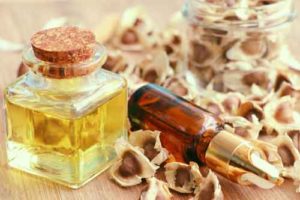Did you know about Moringa SEED OIL and its benefits?
What is moringa seed oil?
Moringa seed oil is derived from the seeds of Moringa oleifera, a small tree native to the Himalayan mountains. Virtually all parts of the moringa tree, including its seeds, roots, bark, flowers, and leaves, can be used for nutritional, industrial, or medicinal purposes. For this reason, it’s sometimes referred to as “the miracle tree.”
Did you know, Moringa Oleifera (Moringa Tree) can prevent at least three hundred known diseases in the world? Every single part of the moringa tree, including stems, seeds, pods, fruits, bark, and root, has precious medicinal values. Therefore, it’s no wonder that Moringa Tree is called ‘Miracle Tree.’
It’s also called the drumstick tree, in reference to the shape of its seed pods. Moringa seeds have a high oil content and contain many nutritional compounds, including monounsaturated fats, protein, sterols, and tocopherols. Moringa oil is produced through a variety of industrial processes, including solvent extraction and cold-pressing. It’s available as an essential oil and as a cooking oil. It’s also an ingredient in hair and skin products.
Extracted from seeds of the most nutrient-dense tree on the planet, Moringa Oil is a rich source of powerful antioxidants, vitamins, and minerals that meets all your skin needs. In Bhava Prakash, the historical textbook of Ayurveda, Moringa Oil is called Sigur (moves like an arrow) for its ability to rapidly and deeply penetrate tissues, even to the depth of the bone marrow for deep cleansing.

Moringa oil uses and benefits!
1 Moringa oil has been used as a medicinal folk cure and as a topical, cosmetic ingredient since ancient times. Today, moringa oil is manufactured for a wide range of personal and industrial uses.
2 Cooking oil. Moringa oil is high in protein and oleic acid, a monounsaturated, healthy fat. When used for cooking, it’s an economical, nutritious alternative to more expensive oils. It’s becoming a widespread nutritional staple in food-insecure areas where moringa trees are grown.
3. Topical cleanser and moisturizer. Moringa oil’s oleic acid makes it beneficial when used topically as a cleansing agent, and as a moisturizer for skin and hair.
4. Cholesterol management. Edible moringa oil contains sterols, which have been shownTrusted Source to lower LDL or “bad” cholesterol.
5. Antioxidant. Beta-sitosterol, a phytosterol found in moringa oil, may have antioxidant and antidiabetic benefits, although more research is needed to confirm this.
6. Anti-inflammatory. Moringa oil contains several bioactive compounds which have antioxidant and anti-inflammatory properties, both when ingested and used topically. This may make moringa oil beneficial for acne breakouts. These compounds include tocopherols, catechins, quercetin, ferulic acid, and zeatin.
Moringa oil products
Moringa oil can be found as:
1.Cooking oil to be used in frying and baking.
2. Essential oil to be used topically on skin and hair Always dilute any essential oil with a carrier oil before using. An ingredient in skin and hair care products, such as soap, liquid cleanser, hydrating toner, massage oil, shampoo, and hair conditioner.
Fast Facts !
- Type of ingredient: Oil.
- Main benefits: Reduces fine lines and wrinkles, improves the overall appearance of the skin, soothes inflammation.
- Who should use it: In general, all skin types can benefit from using moringa oil.
- How often can you use it?: Usage varies depending on the specific product, but in general, moringa oil can be used daily, both AM and PM.
- Works well with: Moringa oil works well with most ingredients.
- Moringa oil can be used with most ingredients.
How to Use Moringa Oil ?
While moringa can be purchased as an oil (i.e. one containing no other ingredients), it’s most often used in conjunction with other ingredients. The oil itself can be used as a moisturizer, hair treatment, or even in cooking. How to Use Moringa Oil. While moringa can be purchased as an oil (i.e. one containing no other ingredients), it’s most often used in conjunction with other ingredients. The oil itself can be used as a moisturizer, hair treatment, or even in cooking.